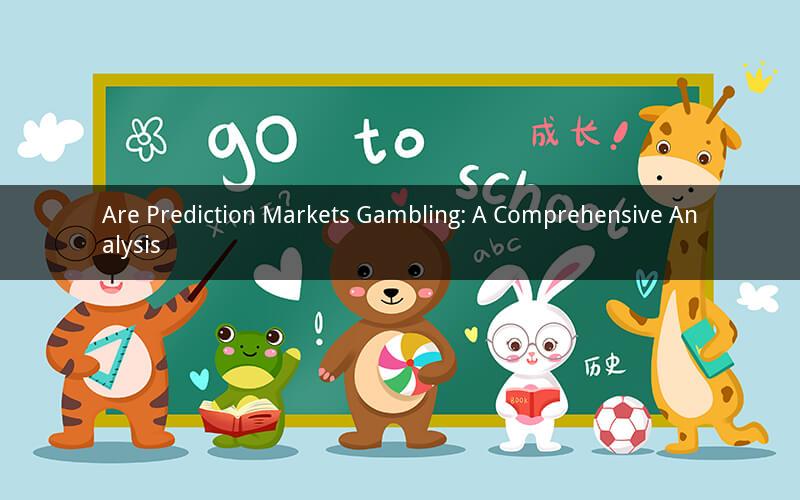
Prediction markets have gained significant attention in recent years due to their ability to forecast future events accurately. However, some people argue that these markets are essentially gambling. This article aims to explore the similarities and differences between prediction markets and gambling, shedding light on the debate surrounding this topic.
1. What are prediction markets?
Prediction markets are platforms where participants buy and sell shares representing the likelihood of a future event occurring. These events can range from political elections to sports outcomes. The prices of these shares reflect the collective opinion of the market participants, and the accuracy of their predictions is measured by the actual outcome of the event.
2. How do prediction markets work?
Participants in prediction markets invest their money in shares that they believe will increase in value based on the likelihood of an event occurring. If the event happens, the shares become more valuable, and participants can sell them at a profit. Conversely, if the event does not occur, the shares lose value, and participants may incur a loss.
3. Are prediction markets gambling?
While prediction markets and gambling share some similarities, there are key differences that distinguish them.
Similarities:
a. Both involve the use of money: Participants in both prediction markets and gambling invest money in the hope of making a profit.
b. Both have an element of uncertainty: The outcome of an event in both prediction markets and gambling is uncertain.
c. Both can lead to financial gain or loss: Participants in both prediction markets and gambling can win or lose money based on the accuracy of their predictions.
Differences:
a. Purpose: Prediction markets are designed to forecast future events, while gambling is solely for entertainment or the chance to win money.
b. Regulation: Prediction markets are typically regulated, whereas gambling is often unregulated or heavily regulated.
c. Skill vs. chance: Prediction markets require participants to have knowledge or expertise about the event, while gambling relies more on luck.
d. Social impact: Prediction markets can have a positive social impact by providing valuable information to decision-makers, while gambling can have negative social consequences.
4. Why are some people against prediction markets?
Despite their potential benefits, some individuals and organizations oppose prediction markets. Here are a few reasons:
a. Ethical concerns: Critics argue that prediction markets can encourage unethical behavior, such as insider trading or manipulation of the market.
b. Inequality: Prediction markets may give an advantage to those with more resources or knowledge, leading to an uneven playing field.
c. Misuse: There is a risk that prediction markets could be used for illegal activities, such as money laundering or betting on prohibited events.
5. What are the benefits of prediction markets?
Despite the concerns, prediction markets offer several benefits:
a. Improved forecasting: By combining the knowledge and opinions of many participants, prediction markets can provide more accurate forecasts than individual experts.
b. Efficient allocation of resources: Prediction markets can help allocate resources effectively by identifying which projects or events are most likely to succeed.
c. Decision-making support: Prediction markets can provide valuable insights to decision-makers, helping them make informed choices.
In conclusion, while there are similarities between prediction markets and gambling, the primary purpose of prediction markets is to forecast future events. The debate over whether prediction markets are gambling is complex, with arguments on both sides. However, it is crucial to consider the potential benefits and risks associated with prediction markets to determine their appropriate role in society.
Questions and Answers:
1. Q: Can prediction markets be used for illegal activities?
A: Yes, there is a risk that prediction markets could be misused for illegal activities, such as money laundering or betting on prohibited events.
2. Q: Are prediction markets regulated in all countries?
A: No, regulation of prediction markets varies by country. Some countries have strict regulations, while others may have none at all.
3. Q: Can prediction markets be manipulated?
A: Like any market, prediction markets can be manipulated. However, the transparency and collective nature of these markets make it more challenging to manipulate them successfully.
4. Q: What is the difference between a prediction market and a traditional stock market?
A: Prediction markets focus on forecasting future events, while traditional stock markets focus on the value of companies and their financial performance.
5. Q: Can prediction markets be used to predict natural disasters?
A: Yes, prediction markets can be used to predict natural disasters, although the accuracy of these predictions may vary.